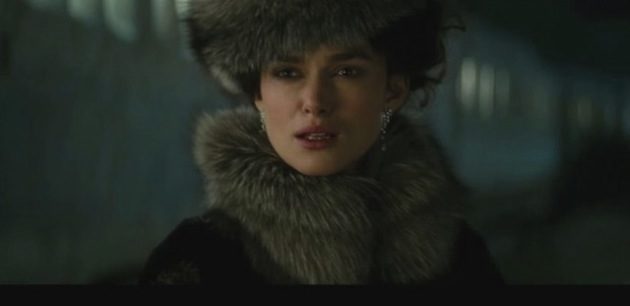Oscars and Obsession: Keira Knightley Talks About 'Jumping Off A Cliff' For Joe Wright In 'Anna Karenina'

At a time when General David Petraeus' affair with his biographer has become a media obsession, Leo Tolstoy's 19th-century tale of love, adultery and aristocratic downfall, Anna Karenina, is more relevant than ever. And yet, with more than two-dozen film and TV adaptations of the novel in existence, director Joe Wright faced a daunting challenge: bringing a fresh perspective to the classic story. The gamble is whether its unique twist will translate into Oscar nominations.
The sumptuous but unorthodox path he took — depicting pivotal scenes as if they were taking part on a theater stage — was akin to "jumping off a cliff" says Keira Knightley, who plays the movie's title character, an alluring Russian aristocrat who breaks entrenched societal taboos and embarks on a torrid love affair with the affluent soldier, Count Vronsky.
"I don't know that we did know it would work," said Knightley. "With Anna Karenina, it's been done so many times before and there was a sense that if you're going to tell this story again, you might as well do something that's out there."
"Out there" includes depicting scenes of the titled heroine (or anti-heroine) on a stage as her marriage and social status disintegrates and she becomes the subject of societal scorn.
"The worst thing we could do is fail," said Knightley. "It was a constant conversation between us to make that balance work. But everyone was so deeply into it."
Wright, who directed the film from a screenplay adaptation by Tom Stoppard, decided just weeks before the shoot to re-work the film with the stage component. Knightely said the change threw the cast, which includes Jude Law and Aaron Taylor-Johnson, into a bit of a frenzy. But she added that the group was determined to give it their all — even if there was a chance it wouldn't work.
"[Joe Wright] demands 110%. He demands complete obsession and that's exactly what he gives back. It makes him an extraordinarily magical person to work with and frightening to work with because it's not a job in which you go home from. It's everything from the time that you're making it, and I think that's one of the reasons people said 'let's do it' with this concept." She added: "He's one of those people you go with and say, 'let's jump.'"
Getting to know Anna Karenina — the character and novel — was also an evolution for Knightley who had a completely different take on the book after re-reading it before production began. The first time she read it as a "sweeping romance," but the second time she wondered if Tolstoy despised Anna.
"I remember thinking [most recently] — and people will disagree with me on this — that Tolstoy hates her and I'm not sure that she's the heroine. I think she's the anti-heroine," said Knightley. "She is the whole of Babylon — she's the person to be judged. But then [Tolstoy] does at times understand her and is completely in love with her. And that's the dichotomy of Anna and what has made her an object of fascination for so many years," Knightley explained. "You're not really sure what to feel about Anna. She is deceitful, manipulative and needy. But she is also wonderful, lovable, and full of energy and love. She's all those things."
Knightley also observed that Anna is a character that makes one take a look at their moral universe, and the actress said she took great pains to keep her from coming off as a gilded cliché.
"She is a creature that makes you look at yourself because you are judging this person, but then you think, 'Do I have a right to do that?'" said Knightley. "The people we hurt the most are the people we love the most. And that's what she does. The difficulty in playing her is you don't want to simplify that. The easy thing to do would be to make her the victim and Karenina the bad guy and I didn't want to do just that."
When the film comes out this Friday, there will likely be another dichotomy: Audiences and critics who love the unconventional stage settings interspersed with more-or-less more traditional linear storytelling and those who'll object. But Knightley is pleased with what will hit the screen.
"I think it's absolutely extraordinary. I haven't seen anything like it. I think it's always going to be something that some people won't like, but I'm very proud of it. If you're talking about cinema as an event - it is certainly an event. You only see naturalism in film at the moment. Whether you think it's over-stylized or not, you have to celebrate the fact that it's so completely different. And I really love it. And I love how daring Joe has been and I'm very glad I jumped off the cliff with him."
Follow Brian Brooks on Twitter.
Follow Movieline on Twitter.

Comments
Can't wait to see this. But Anna isn't condemned for her torrid love affair -- those were the order of the day; it's what the aristocracy did. She was condemned because she was open about her feelings, punished for the impropriety of her honest total immersion. I keep hearing comments that Karenin, the Jude Law character, is holy and faultless, poor cuckold husband. But he would have accepted Anna's affair if she had just been discrete. What sort of a Christian shows no mercy? What sacrament marriage without love? Tolstoy examines his own thoughts about society, religion, and the individual in this work, and those are the eyes I'll take to this theatre.
Read More at: http://movieline.com/2012/11/14/keira-knightley-anna-karenina-oscars/#utm_source=copypaste&utm_campaign=referral